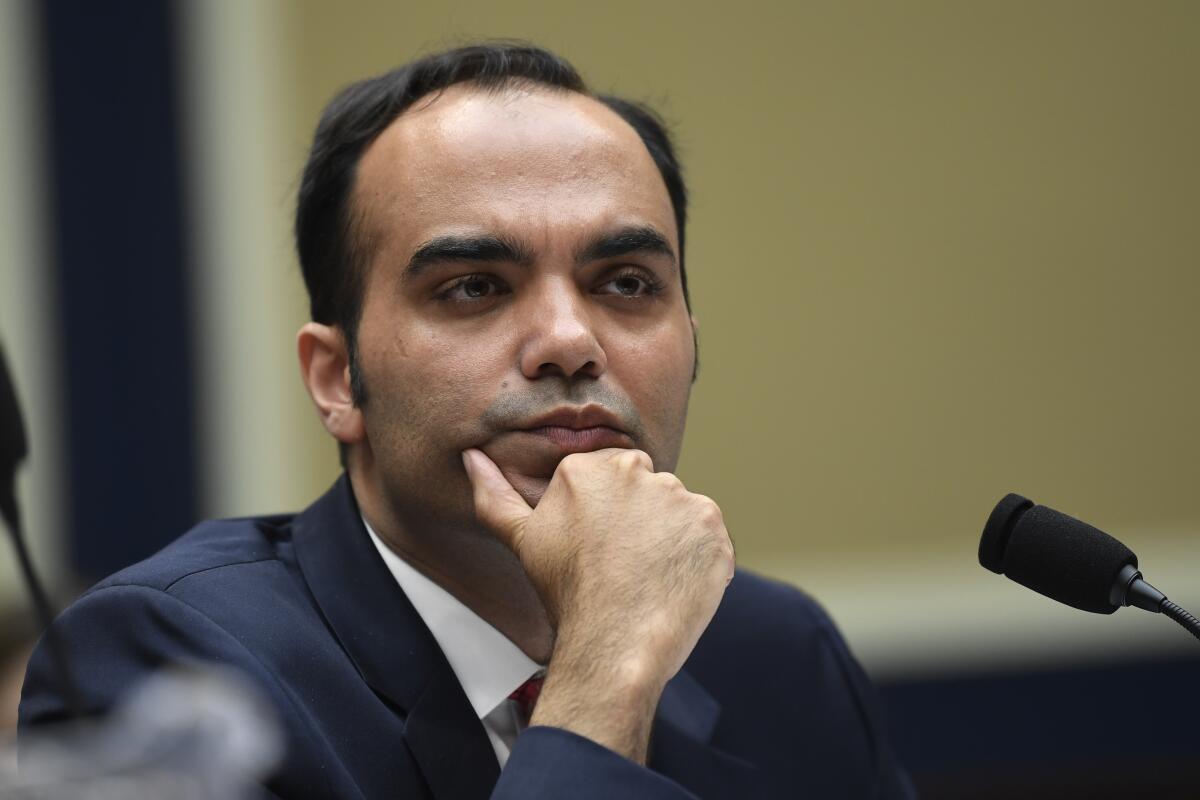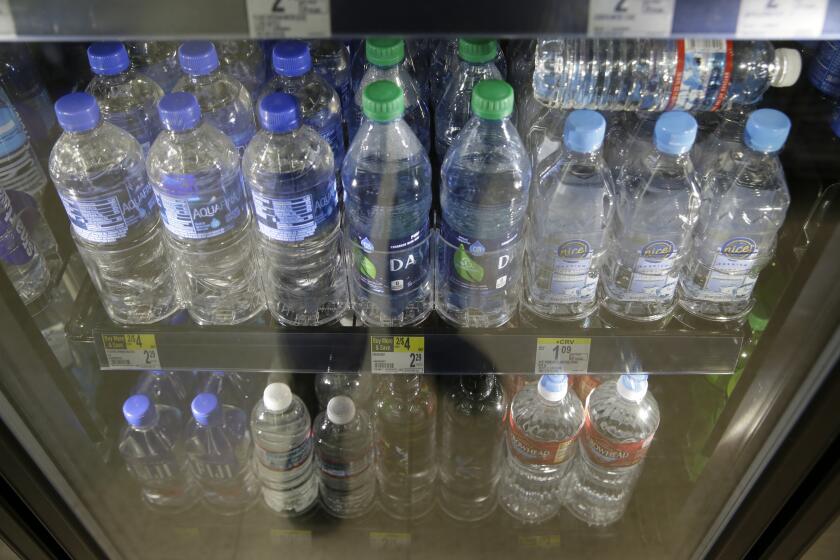Rohit Chopra, Biden’s pick to head CFPB, finally gets Senate nod (barely)

- Share via
President Biden nominated Rohit Chopra to serve as the nation’s top consumer financial watchdog eight months ago. On Thursday, he finally got past Republican opposition and was approved as the new head of the Consumer Financial Protection Bureau.
Although Chopra, a former CFPB assistant director and member of the Federal Trade Commission, is profoundly qualified for the director’s job, Republican senators didn’t make it easy for him (perhaps because he’s profoundly qualified for the job).
In a preliminary vote, all 50 Republican senators voted against Chopra, and all 50 Democrats and independents voted for him. Vice President Kamala Harris broke the tie with a vote in Chopra’s favor.
In the final confirmation tally, Chopra prevailed 50 to 48. Republicans Rand Paul of Kentucky and John Cornyn of Texas didn’t vote.
This is a big deal for consumers because for the last four years we’ve essentially been without the consumer protection agency that Congress mandated in 2010.
Let’s say there was a federal agency charged solely with protecting consumers from financial abuse.
Under former President Trump, the CFPB abandoned its watchdog role, choosing instead to focus on “educating” people to be better money managers.
Which is to say, the focus was no longer on protecting us from abusive behavior by banks, payday lenders and other financial firms.
“During the Trump administration, the CFPB performed little oversight over the industry it regulated,” said Remington Gregg, an attorney with the advocacy group Public Citizen.
“Under Rohit Chopra, there’s a new sheriff in town,” he told me. “We are confident that protecting consumers from predatory lenders and corporate cheats will be his main priority.”
I heard the same Thursday from other consumer advocates.
Sally Greenberg, executive director of the National Consumers League, told me Chopra is “ideally suited to head this critically important consumer protection agency.”
True that. He brings a wealth of experience to the top spot at the CFPB, along with a proven track record of defending consumer interests.
“There’s no more qualified candidate in the U.S. government for this job,” said Jamie Court, president of Consumer Watchdog, a Los Angeles-based advocacy group.
“He helped build the agency and turn it into a tiger with teeth,” Court said. “He will be a tough cop who wields a big stick.”
Chopra’s predecessor at the CFPB, under Trump, was Kathy Kraninger, who had zero experience with consumer protection before being handed the gig in 2018.
In what would be a laughable move if it wasn’t so incredibly tragic, the Trump administration’s newly emasculated Consumer Financial Protection Bureau this week sided with payday lenders over consumers.
Her approach was basically to tell consumers it’s their job to look after themselves.
“Empowering consumers to help themselves, protect their own interests, and choose the financial products and services that best fit their needs is vital to preventing consumer harm and building financial well-being,” Kraninger said in a 2019 speech.
Another way to prevent consumer harm and build financial well-being is to make sure financial firms follow the law and treat people fairly — the core mission of the CFPB.
But enforcement actions and fines levied by the agency plunged under Trump.
In the 2020 fiscal year, which ran through last September, many CFPB fines were little more than a joke. Of 34 fines collected, 13 were for $10 or less. Ten were for just $1.
Seriously. A buck.
Is it any wonder Republican senators were so reluctant to put Chopra in charge? Financial firms contributed nearly $82 million to GOP senators last year — about double what they gave to Democrats, according to OpenSecrets, which tracks political money.
The Trump years were like Christmas for companies overseen by the CFPB. Perhaps nothing makes that plainer than the CFPB declaring in January 2020 that it would no longer hold financial firms to account for abusing customers.
Trump’s CFPB argued that even though the federal law that created the bureau explicitly tasked it with preventing abusive behavior, “uncertainty remains as to the scope and meaning of abusiveness.”
Just savor that for a moment. Our top financial watchdog claimed with a straight face that it’s just too darn hard to figure out if the thing that keeps quacking like a duck is really a duck.
Prior to Trump taking power, the CFPB returned almost $12 billion to consumers abused by financial institutions.
The Biden administration rescinded Trump’s boneheaded see-no-abuse stance in March.
It reminded the financial industry that abusive behavior includes “taking unreasonable advantage of someone who can’t protect” himself or herself and “taking unreasonable advantage of someone who relies on a company to act in their interests.”
Oh yeah, that (hi, Wells Fargo!).
Hopefully there’ll be no such confusion with Chopra at the CFPB’s helm.
Sales of bottled water have soared during the pandemic. Many Americans may not realize they’re just paying a huge markup for tap water.
“Having served the bureau previously, he has the understanding and background to guide the agency in its top priority — to protect consumers,” said Linda Sherry, director of national priorities for Consumer Action.
Chopra is expected during his five-year term to step up the CFPB’s enforcement actions and to focus in particular on private student lenders and loan servicers. He previously served as the agency’s student loan ombudsman.
Mike Litt, a spokesman for the U.S. Public Interest Research Group, noted that Chopra stressed during his confirmation hearing that he would ensure consumers are protected as the economy recovers from the COVID-19 pandemic.
“He also talked about long-standing problems consumers have had in the marketplace before the pandemic, such as errors on credit reports and debt collection harassment,” Litt said. “We agree with those priorities.”
Carl Tobias, a law professor at the University of Richmond, told me that “the CFPB that was essentially moribund in the Trump years,” and Chopra probably will now get the agency back on track.
“Examples of issues on which he might focus are payday lending and inflated overdraft fees on checking accounts,” Tobias predicted.
However it plays out, consumers can be comforted that someone once again takes their financial welfare seriously.
It’s been a long time.
Coffee prices, and food costs in general, are rising because of climate change. For consumers, that’s a good reason to take this problem seriously.
More to Read
Inside the business of entertainment
The Wide Shot brings you news, analysis and insights on everything from streaming wars to production — and what it all means for the future.
You may occasionally receive promotional content from the Los Angeles Times.













